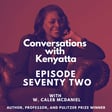
A Conversation with Professor Jefferson Cowie
In this week's episode of Conversations with Kenyatta, Kenyatta D. Berry, author of The Family Tree Toolkit and host of PBS' Genealogy Roadshow is joined by Pulitzer Prize Winner, author, and historian, Dr. Jefferson Cowie.
The two discuss his latest book Freedom's Dominion: A Saga of White Resistance to Federal Power, which won the Pulitzer Prize in History, his research, and so much more.
ABOUT DR. JEFFERSON COWIE (as taken from Vanderbilt.edu)
Jefferson Cowie's work in social and political history focuses on how class, race, and labor shape American politics and culture. His latest book, Freedom's Dominion, won the Pulitzer Prize for History in 2023.
Based on one county’s history, Freedom’s Dominion: A Saga of White Resistance to Federal Power tells the dramatic tale of generations of local fights against the federal government that prop up a particular version of American freedom: the freedom to oppress others. Advance praise calls it "magisterial," written with "eloquence and with brilliance," and Cowie's "most extraordinary book yet."
The Great Exception: The New Deal and the Limits of American Politics was released in early 2016 and attempts to reinterpret a wide swath of American political history in the twentieth century. The Washington Post‘s E.J. Dionne Jr. called it “one of the year’s most important political books."
Stayin’ Alive: The 1970s and the Last Days of the Working Class, draws together labor, politics, and popular culture into a vibrant narrative about the decline of class in American political culture. It received a number of “best book” awards, including the 2011 Francis Parkman Prize for the Best Book in American History and the Merle Curti Award for the Best Book in Social and Intellectual History. Critics said, “Stayin’ Alive will long stand as the finest and most sophisticated portrait of politics and culture in the American 1970s, and also as a model for how to talk about both political and cultural transformations without shortchanging either.”
Capital Moves: RCA’s Seventy Year Quest for Cheap Labor charts the relocation of one firm through four different cities, two countries, and a great deal of social upheaval. It accounts for what made each community attractive for an industrial location and what changed to make the company relocate again. The book received the 2000 Phillip Taft Prize for the Best Book in Labor History.
In addition to his scholarship, Cowie’s essays and opinion pieces have also appeared in the New York Times, TIME magazine, NPR Music, Foreign Affairs, Chronicle of Higher Ed, American Prospect, Politico, Democracy, The New Republic, Inside Higher Ed, Dissent, and other popular outlets. The recipient of several fellowships, including the Center for Advanced Studies in Behavioral Sciences at Stanford University, the American Council of Learned Societies and Andrew Mellon Foundation, the Society for the Humanities at Cornell, and the Center for US-Mexican Studies at UC San Diego, he has also appeared in a variety of media outlets including CNN’s The Seventies, C‐Span’s Booknotes, NPR’s Weekend Edition, as well as documentaries, podcasts, and radio broadcasts.
The music for this episode, as always, is "Good Vibe" by Ketsa.
We are dedicated to exploring and discussing various aspects of genealogy, history, culture, and social issues. We aim to shed light on untold stories and perspectives that enrich our understanding of the world.
**Please note that some links in our show notes may contain affiliate links, on which Kenyatta receives a small commission.



















